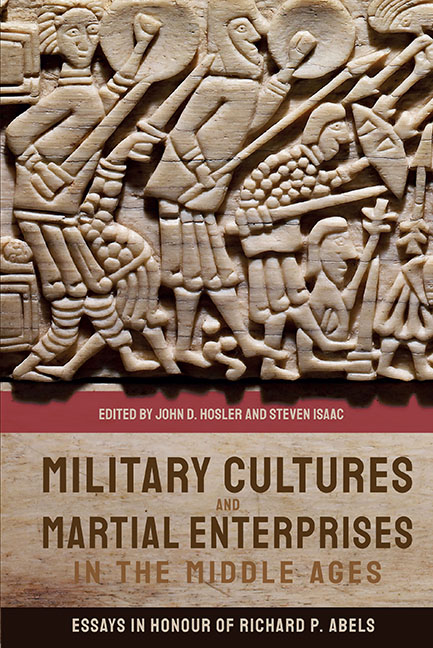Book contents
- Frontmatter
- Contents
- List of Illustrations
- Notes on Contributors
- Introduction and Appreciation
- 1 Charlemagne’s Invasion of Spain in 778: The Anatomy of a Strategic Failure and its Impact
- 2 Military Intelligence and Strategic Planning Under the Ottonian Kings of Germany, 919–1024
- 3 Ain’t Nobody Here But Us Chickens: Defeated Warriors, Masculinity, and Mistaken Identity in Western Europe, 679–1141
- 4 Count Baldwin V of Flanders: Broker of Eleventh-Century Power
- 5 Kings and Fortuna: The Meanings of Brémule
- 6 Fighting the Last War: Remembering the Norman Conquest during the Anarchy
- 7 Gilbert of Mons’ Chronicle of Hainaut as a Source for Military History in the Twelfth Century
- 8 At Home with Roger of Howden
- 9 Embedded Reporters? Ambroise, Richard de Templo, and Roger of Howden on the Third Crusade
- 10 The Treatment of Male and Female Prisoners of War during the Third Crusade
- 11 Exempla, Crusade, and Chivalry
- 12 Frontier Warfare in the St Omer Chronicle
- 13 Some Observations on the Training of Medieval Warhorses
- Richard P. Abels’ Curriculum Vitae
- Index
- Tabula Gratulatoria
11 - Exempla, Crusade, and Chivalry
Published online by Cambridge University Press: 21 October 2020
- Frontmatter
- Contents
- List of Illustrations
- Notes on Contributors
- Introduction and Appreciation
- 1 Charlemagne’s Invasion of Spain in 778: The Anatomy of a Strategic Failure and its Impact
- 2 Military Intelligence and Strategic Planning Under the Ottonian Kings of Germany, 919–1024
- 3 Ain’t Nobody Here But Us Chickens: Defeated Warriors, Masculinity, and Mistaken Identity in Western Europe, 679–1141
- 4 Count Baldwin V of Flanders: Broker of Eleventh-Century Power
- 5 Kings and Fortuna: The Meanings of Brémule
- 6 Fighting the Last War: Remembering the Norman Conquest during the Anarchy
- 7 Gilbert of Mons’ Chronicle of Hainaut as a Source for Military History in the Twelfth Century
- 8 At Home with Roger of Howden
- 9 Embedded Reporters? Ambroise, Richard de Templo, and Roger of Howden on the Third Crusade
- 10 The Treatment of Male and Female Prisoners of War during the Third Crusade
- 11 Exempla, Crusade, and Chivalry
- 12 Frontier Warfare in the St Omer Chronicle
- 13 Some Observations on the Training of Medieval Warhorses
- Richard P. Abels’ Curriculum Vitae
- Index
- Tabula Gratulatoria
Summary
IN HIS LONG AND DISTINGUISHED career Richard Abels has shown a commendable breadth of interests no less than an admirable depth of analysis. Touching even briefly on a few aspects of that range of interests, I offer this contribution to his Festschrift. First, since crusade has been one of the many topics engaging Professor Abels, I am encouraged to consider an aspect of crusading propaganda, even though I cannot claim personal credentials as a crusade historian and only approach that subject through long study of chivalry, elite violence, and practiced knightly piety. Second, Abels has demonstrated a commendable recognition of the value of artistic and material artifacts as historical evidence. Since this approach parallels my own efforts to utilize medieval imaginative literature as valid and valuable historical evidence, I will welcome his testimony whenever I may be summoned before a tribunal for the scholarly heresy of my own approach. Finally, I will attempt to link the propagandistic use of exempla, colorful moral stories for sermons, meditation, or simple enjoyment, not only with crusade but with key chivalric modes of thought in general.
Surely, as Abels recognized, we should cast our evidentiary nets widely, to take in a generous haul, and never deny ourselves a rich catch of evidence, even if we must analyze what we find. In that spirit I would like to extend or at least focus the case for imaginative evidence through the use of exempla and miracle stories, as presented in sermons (that presumably reached many); and I will turn in particular to manuscript books of tales made for reflection and entertainment (presumably the property of elite households). These exempla (with characters and incidents worthy of medieval literary fiction) are likely not simple and unmediated reportage; it is difficult for moderns, at least, to believe that they “really happened” just as narrated. And if they were, in fact, piously created rather than simply neutrally recorded, their significance for scholarly analysis is actually enhanced; for from them we can manage a crucial look into mentalité.
These sources have not, it seems to me, been incorporated as fully as they might usefully be into our scholarly enterprise. Despite some outstanding exceptions – Christoph Maier in Zurich comes readily to mind – our general studies of crusade and our class syllabus are not replete with exempla. I think they could be, with good results in publication and in the classroom.
- Type
- Chapter
- Information
- Military Cultures and Martial Enterprises in the Middle AgesEssays in Honour of Richard P. Abels, pp. 211 - 222Publisher: Boydell & BrewerPrint publication year: 2020



